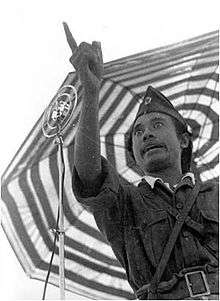Sutomo
| Sutomo (Bung Tomo) | |
|---|---|
 Soetomo | |
| 10th Minister of Manpower and Transmigration of the Republic of Indonesia | |
|
In office 27 August 1964 – 26 March 1966 | |
| President | Soekarno |
| Preceded by | Ahem Erningpradja |
| Succeeded by | Awaluddin Djamin |
| Personal details | |
| Born |
October 3, 1920 |
| Died |
October 7, 1981 (aged 61) |
| Nationality |
|
| Religion | Islam |
Sutomo (3 October 1920 – 7 October 1981),[1] also known as Bung Tomo, is best known for his role as an Indonesian military leader during the Indonesian National Revolution against the Netherlands. He played a central role in Battle of Surabaya when the Dutch attacked the city in October and November 1945.
Early life
Sutomo was born in Kampung Blauran in the centre of Surabaya to a clerk father, Kartawan Tjiptowidjojo, and mother of mixed Javanese, Sundanese and Madurese descent. He had received Dutch secondary education before the Japanese occupation. Alongside menial jobs, he joined the Indonesian Scouting organisation and at the age of seventeen as the second Pramuka Garuda; a rank achieved by only three Indonesians before the Japanese occupation during World War II. During the occupation period he worked for the Dōmei Tsushin in Surabaya. Sutomo became famous by setting up Radio Pembarontakan (Radio Rebellion), which promoted unity and fighting spirit among the Indonesian pemuda (youth).
Battle Of Surabaya and race-based execution of civilians
"Hey British soldiers! As long as the Indonesian bulls, the youth of Indonesia, have red blood that can make a piece of white cloth, red and white, we will never surrender. Friends, fellow fighters, especially the youth of Indonesia, we will fight on, we will expel the colonialists from our Indonesian land that we love... Long have we suffered, been exploited, trampled on. Now is the time for us to seize our independence. Our slogan: FREEDOM OR DEATH. ALLAH IS GREAT... ALLAH IS GREAT... ALLAH IS GREAT.. FREEDOM!"
Bung Tomo's speech, 9 November 1945.[2]
During the Japanese occupation, Sutomo was chosen in 1944 as a member of the Japanese-sponsored Gerakan Rakyat Baru (New People's Movement). During the early stages of the Indonesian National Revolution he played a central role when Surabaya came under British attack. Although the Surabaya city was lost to the British, the battle served to galvanise Indonesian and international opinion in support of the independence cause. Sutomo spurred thousands of Indonesians to action with his distinctive, emotional speaking-style of his radio broadcasts. His "clear, burning eyes, that penetrating, slightly nasal voice, or that hair-raising oratorical style that second only to Sukarno's in its emotional power".[1] During the Bersiap perod, Sutomo encouraged atrocities against Indonesians of mixed European–Asian ancestry[3][4] and personally supervised the summary executions of hundreds of civilians. An archived eye witness testimony of the events of 22 October 1945 states:[5]
"Before each execution Sutomo mockingly asked the crowd what should be done with this "Musuh (enemy) of the people". The crowd yelled "Bunuh!" (kill!) after which the executioner named Rustam decapitated the victim with one stroke of his sword. The victim was then left to the bloodthirst of boys 10, 11 and 12 years old. ...[who] further mutilated the body." "Women were tied to the tree in the back yard and pierced through the genitals with "bambu runcing" (bamboo spears) until they died."
Post-independence
His relationship with President Sukarno soured after Bung Tomo offended the president by asking about personal matters.[6] After the 1950s, Sutomo emerged again as a national figure during the 1965 turbulent period. Initially, he supported Suharto to replace the left-leaning Sukarno government, but later opposed aspects of the New Order regime.[1] On 11 April 1978, he was detained by the government for his outspoken criticism of corruption and abuses of power; upon his release three years later, however, Sutomo continued to loudly voice his criticisms. He said that he did not want to be buried in the Heroes' Cemetery because it was full of "fairweather heroes" who had lacked the courage to defend the nation at times of crisis, but when peace came appeared in public to glorify their achievements.[6]
Personal life
On 9 June 1947, Sutomo married Sulistina in Malang, East Java.[2] He was known as a devoutly religious father of five who took religious knowledge seriously throughout his life. Before his death, Sutomo managed to finish a draft of his own dissertation on the role of religion in village-level development. On 7 October 1981, he died in Mecca, Saudi Arabia, during his Hajj pilgrimage.[1] His family and friends had his body returned to Indonesia. Although his reputation and military rank gave him the right to be buried in the Heroes' Cemetery, he was laid to rest in public burial ground at Ngagel, Surabaya, East Java.
See also
References
- 1 2 3 4 Frederick 1982.
- 1 2 Sulistina Soetomo 1995.
- ↑ Who is responsible for ‘Bersiap’? The Jakarta Post
- ↑ Meijer, Hans. 'In Indie geworteld, de Geschiedenis van Indische Nederlanders, de twintigste eeuw.' (Publisher Bert Bakker, Amsterdam, 2004) P.245 ISBN 90-351-2617-3. Note: Citing Dutch newspaper 'De Haagsche Post', article dated 4 December 1954.
- ↑ Note: These legal testimonies formerly designated top secret have been made public and are available online. See: Van der Molen, Pia Bussemaker, Herman Archief van Tranen website (2012). Document: 125_A_B_C_D_E_F Online archive
- 1 2 Wahyudi, M Zaid (10 November 2007). Kompas. pp. 1 & 15. Missing or empty
|title=(help)
Bibliography
- Frederick, William H. (April 1982). "In Memoriam: Sutomo". Indonesia (Cornell University Southeast Asia Program) 33: 127–128.
- Soetomo, Sulistina (1995). Bung Tomo, Suamiku [Bung Tomo, My Husband] (in Indonesian). Pustaka Sinar Harapan. ISBN 978-979-416-313-9.
|